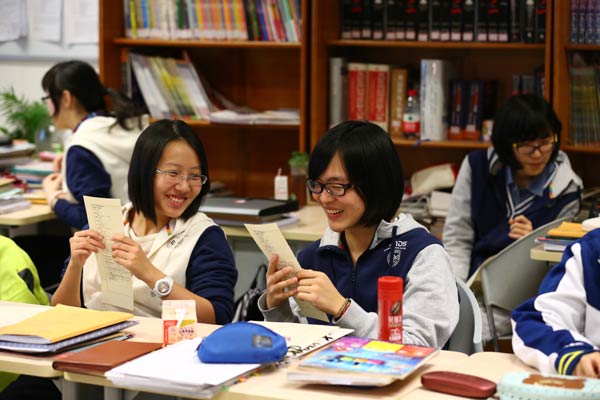

Two high school seniors at Beijing National Day School talk about their test results after an English pop quiz in April 2013. The school's pilot reform gives students more say in their courses. PROVIDED TO CHINA DAILY
The reforms in curriculum and student nurturing now taking place in a Beijing school may spread and be copied by schools nationwide, experts said.
Beijing National Day School, a reputable institution in the capital's Haidian district, is allowing students to select courses according to their own needs and interests.
That means students are no longer forced to study in a fixed classroom with the same teachers and classmates for three years. Instead, they can choose the courses they like among hundreds of options, move from one classroom to another and study with students from different grades - just as college students do.
"We provide diversified courses, create a tolerant environment and give students the autonomy to arrange their own course of study with the hope that students can realize who they are and what they want to do," said Principal Li Xigui, adding that each of the school's 4,000-plus students has a unique curriculum.
"We hope that they can gain independent personalities and minds, as well as find the drive to develop themselves," he said.
Selected by the Ministry of Education as a pilot site in 2011, the school started the curriculum reform in early 2009.
The comprehensive curriculum system, different from most schools across the country, comprises 265 courses on some basic subjects like Chinese, math, physics, geography and so on; 30 experiential courses, during which students can be fully engaged in practical activities such as conducting experiments; and 75 courses that allow students to observe and experience different occupations and help them identify what they want to do as a career.
The courses on basic subjects are also divided into several levels based on degree of difficulty, and students can choose among different levels according to their own needs.
Liu Yilun, a sophomore at the school, said that for most subjects, he had chosen the second-level courses, which can prepare him for the gaokao, China's college entrance examination.
"For students who are more capable and wish to perform better in some subjects, they may choose higher-level courses. For example, a student who is extremely interested in math and is ambitious to secure a prize in the Mathematical Olympiad may take the fourth-level math courses," he said.
Jia Xinping, also a sophomore of the school, said he liked the new curriculum system, which gave students the freedom to make their own choices.
"It also gives us a great opportunity to figure out what our interests, abilities and advantages are, and we also have learned how to make our own schedules and how to make better use of our time and energy," he said.
Copyright ©1999-2018
Chinanews.com. All rights reserved.
Reproduction in whole or in part without permission is prohibited.